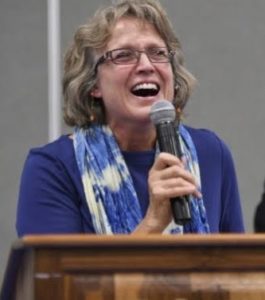CW: If you or someone you know is experiencing an eating disorder, please seek help. You can call, chat, or text with trained counselors at the National Eating Disorders Helpline by clicking here.
The cloyingly bright high school classroom lighting glistened against the whiteboard and onto the Emily-Dickinson-quote-embellished yellow walls. The weight of 40 10th-grade Honors English students’ eyes settled onto the clock, as if the gravity of our stares would draw the minute hand closer to lunch time.
“Class, before I let you go to lunch early, I have a quick announcement to make.” Ms. Mansfield’s deeply soulful voice never failed to bring us back to reality.

“As a preface to what I’m going to say, this announcement is not meant to scare you. I assure you that I am okay, there are just going to be a couple of changes in this class, and I wanted to give you a head’s up.” The class exchanged concerned looks, but Ms. Mansfield’s face remained steadily in her natural upturned smile.
“I wanted to let you all know that I’ll be taking a bit of a break from teaching after winter break next month. I have never told any of my students this, but I’ve been sick for quite a while now, and my doctors and I have decided that now’s the time to fight this head on. I lost my hair this week, but I will never lose my love for you guys. PLEASE PLEASE PLEASE don’t worry about me. I promise I’ll be fine. I have Viking blood—my ancestors prepared me for this. Sorry to keep you guys so long! Enjoy your lunch!!”
A month later, we closed our white-speckled colorful composition notebooks after our last free-write assignment with Ms. Mansfield. As I had promised, I did not feel worried. I had full confidence that Ms. Mansfield would be okay; I just felt a bit empty knowing this would be my last time seeing her in that classroom where I found my love for writing. If only I knew then what I knew a few days later. As it turned out, Ms. Mansfield’s last day at Milken Community High School was one of my last days there, too.
Just as Ms. Mansfield left teaching to fight her illness head on, I left school to fight my own illness head on. At that point, I had been struggling on and off with disordered eating for about four years. However, in the months leading up to Ms. Mansfield’s departure, my illness progressed into a full-blown eating disorder, and by the time she made her graceful exit, my mind and body gave out. I was admitted to the hospital for the first of thirteen times over the next year and a half.
My first night in the hospital, I was told that given my condition, it made little sense that I was even conscious. But I had no headspace left to process the devastating reality that consumed me. My mind was stuck in two places: gymnastics and school.
I was 15 at the time and had been training as a competitive rhythmic gymnast for four years. As an ambitious 11-year-old, I had no idea that the sport I had chosen would be full of both mental and physical abuse by my coaches and judges at competitions. Blinded to the reality of my situation, I developed an obsession with the sport, and having to give it up because of my eating disorder was devastating. I had to get out of the hospital, and fast, so I could get back to training.
As for school, I had to tell my teachers I’d be out for a while, and to make sure that they send me all the work I’d miss so I didn’t fall behind, or worse, tarnish my perfect GPA. I emailed all my teachers, explaining that I wasn’t feeling well and would be out of school for a few days.
I emailed Ms. Mansfield last. Thinking back on her courage and vulnerability when bearing the news of her illness. I was moved to explain my situation more in depth.
The following was her response:
Oh my Sophie,
Thank you for trusting me with this painful information. (And thank you, of course, for your second gorgeous and heartfelt letter. It is another that I am printing out to save.)
So. Eating disorders. I hope you will not think me presumptuous if I share with you my own experience with eating disorders.
As I think you know, I was a full-on scholarship ballet dancer in NYC when I was around your age. (If you are a gymnast, I suspect you know something of that crazy ballet culture.) So, when the “adults” in charge told me I needed to lose weight …..I went on a radical diet and lost weight. And kept losing. And this was before they had a word for “anorexia.”
Long story short, it was one of the primary reasons I finally had to give up my dreams of being a dancer. Very unhealthy world for me. Fortunately for me, I had (apparently) a very strong survival instinct. In spite of what the adults told me, I felt myself disappearing, and I knew it wasn’t right. I credit this instinct with saving me then, as well as fortifying me now to do what I need to do.
Another happy outcome for me from that difficult period: I turned to reading and writing, and learned that I had strengths and options beyond the very closed and claustrophobic world of ballet.
You have the same survival instinct, Sophie. I knew I saw something fierce and resilient and unquenchable about your spirit, and now I know what that was all about. You can do anything, and be anything you want; all you need to do is listen to that strong, wise (and quite eloquent!) little voice inside yourself. You have only to listen—you have everything you need to make yourself whole again. And you will. And you will write about your journey back to health. And you will share that beautiful writing with me, yes?—whenever you feel like it—and know that I will savor every delicious word.
I have more to say (don’t I always?) but will not overload you right now. And besides, you are going to be my special pen pal for this semester, right? And we can share our experiences with writing and life and personal revelations and anything/everything else, okay?
You clearly have wonderfully caring parents who are taking good care of you, so that is an excellent plus.
Another plus is that you are going to emerge from this stronger and with a heightened ability to see into the heart of things. Someone who has experienced something so life-altering will see the world with more depth and color than will someone who has not—and in that way alone you will have a great deal more to give the world and all of us.
Thank you for keeping me in your prayers—I will be keeping you in mine as well. And speaking of courage and perseverance—you’ve got all that and a pan of biscuits (as they say in Tennessee.) I am so proud of the fight in you.
Stay in touch, please, Sophie. I am going to be thinking of you every day and sending you my most potent (and mine are ferociously potent!) thoughts and wishes.
Love, love, love,
Ms. Mansfield
I don’t think I’ve ever been able to read this email without crying. And I’ve read it many, many times. I cry at the sheer gravity that the words above saved my life. Reading about how Ms. Mansfield began to build her identity as a writer after leaving ballet encouraged me to pick up writing more seriously. I wrote almost every day. I wrote angry, messy prose in Sharpie that bled onto the sheets. I wrote loopy cursive poems with misspelled words and nonexistent punctuation. And I sent all of it to Ms. Mansfield.
She sent back care packages full of literary goodies—books and notebooks and pens and tiger’s eye stones and pictures of herself with her grandchildren. She even sent me the manuscript of her soon-to-be-published fantasy novel, Between the Song and the Sigh, which she kindly asked if I could be an unofficial editor for.
Finally, I had a purpose. It had nothing to do with the toxicity of rhythmic gymnastics or the eating disorder that overtook my identity after leaving the sport. My purpose was to change the world through writing.
I went on to publish some of my writing, all of which was inspired by my experience as a survivor of mental illness. Every publication was met with emails from Ms. Mansfield bursting at the seams with congratulatory wishes and faery emojis.
At her funeral this past July, I sat in front of a Zoom screen full of somber-faced family, students, and community members. In my mind, I was formulating an email to Ms. Mansfield about this incredible idea I had for my next published piece of writing—a narrative essay about her kindness.
Read a bit more about Melody Mansfield here: https://scbwikitetales.wordpress.com/2018/09/05/community-corner-with-melody-mansfield-how-faeries-and-scbwi-saved-my-life/




















